2023届高考英语复习核心重点句型归纳+对点训练讲义
文档属性
| 名称 | 2023届高考英语复习核心重点句型归纳+对点训练讲义 | 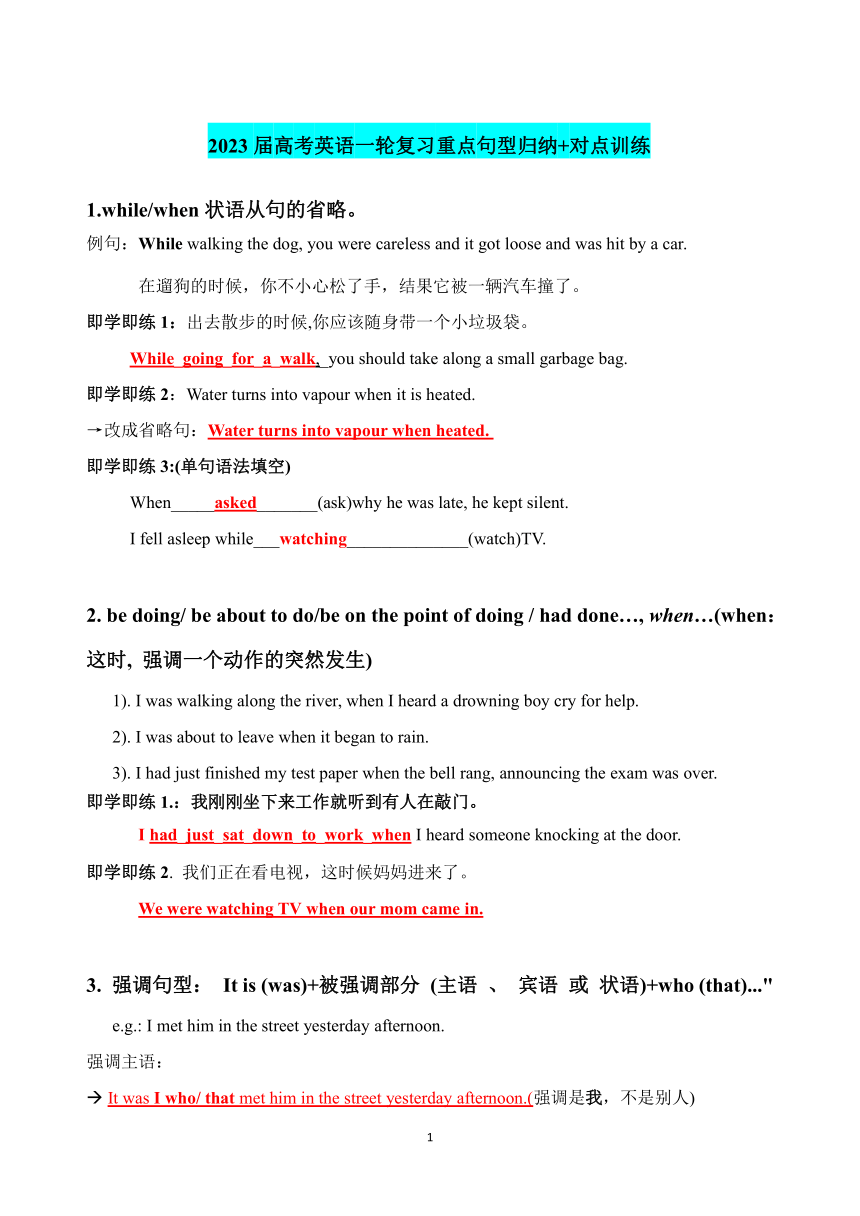 | |
| 格式 | zip | ||
| 文件大小 | 42.1KB | ||
| 资源类型 | 教案 | ||
| 版本资源 | 通用版 | ||
| 科目 | 英语 | ||
| 更新时间 | 2022-11-02 19:20:14 | ||
图片预览

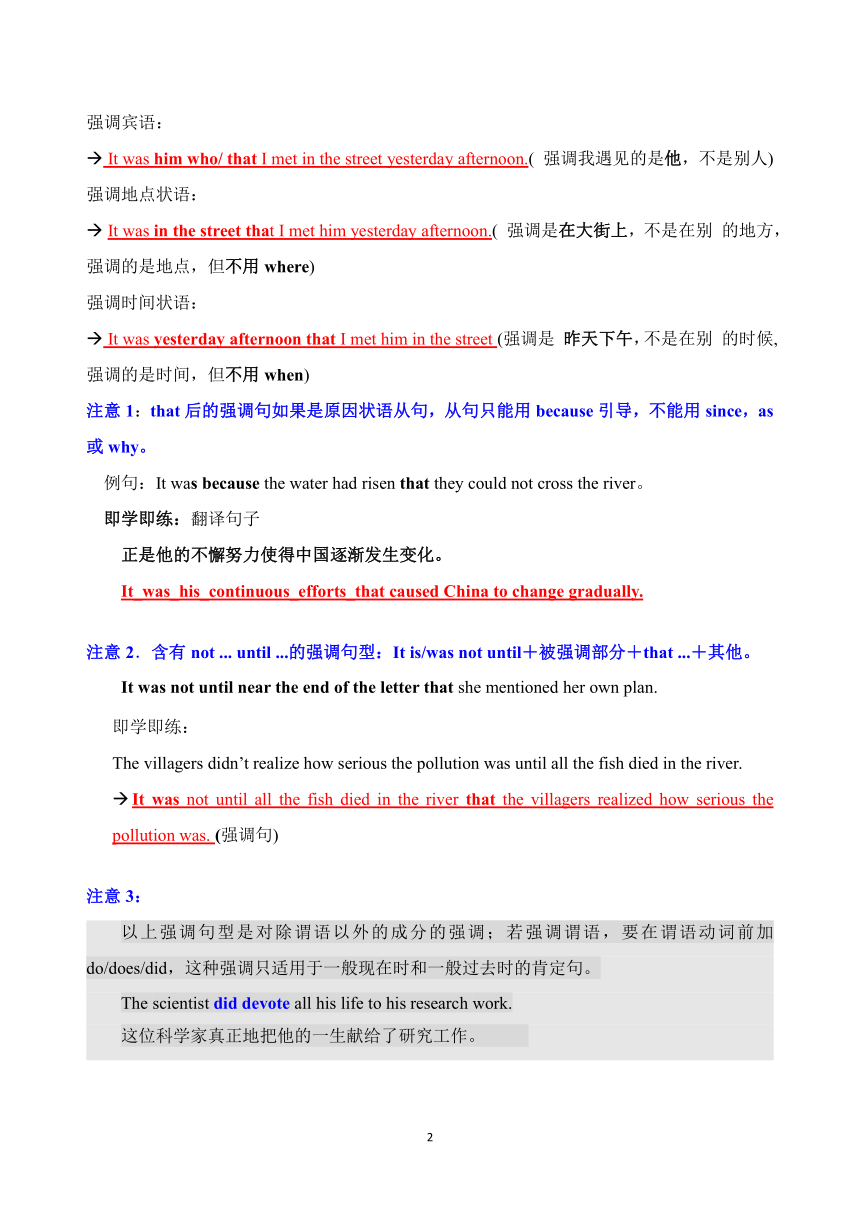
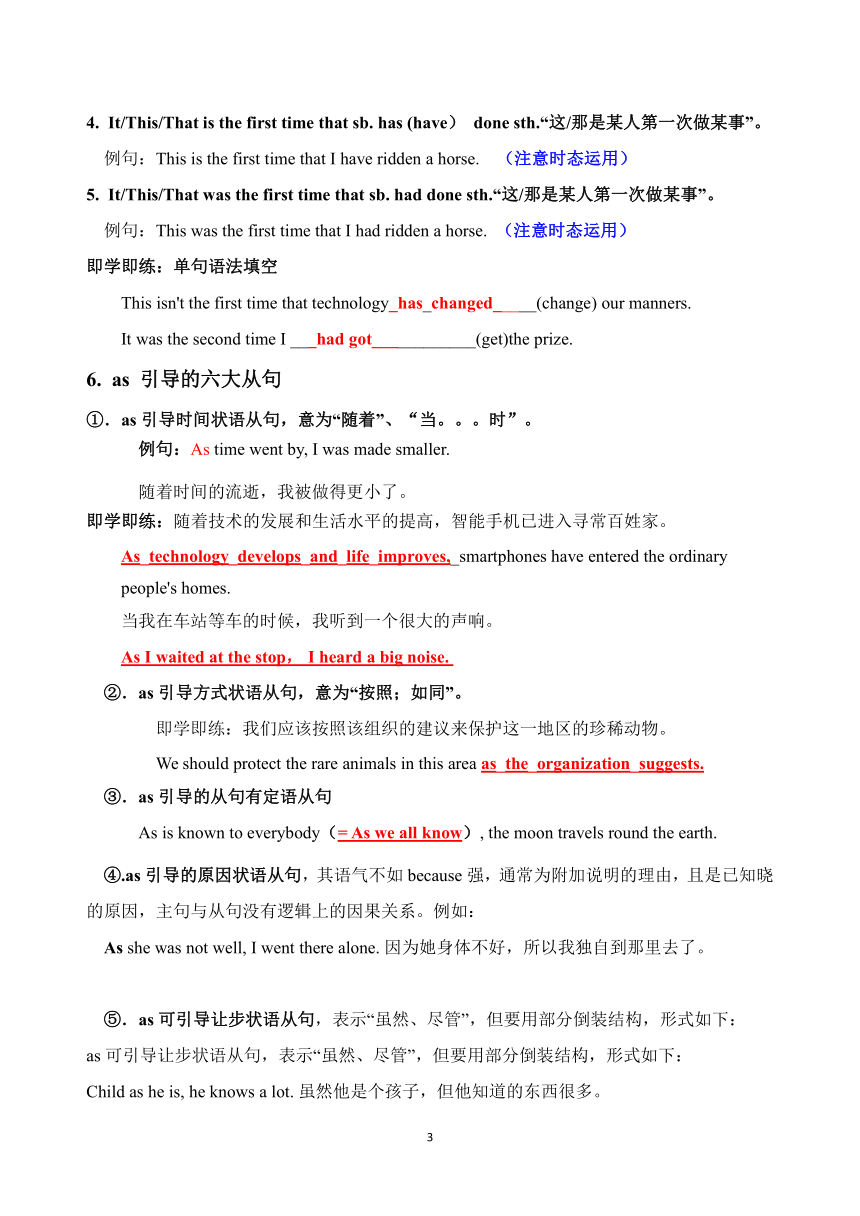
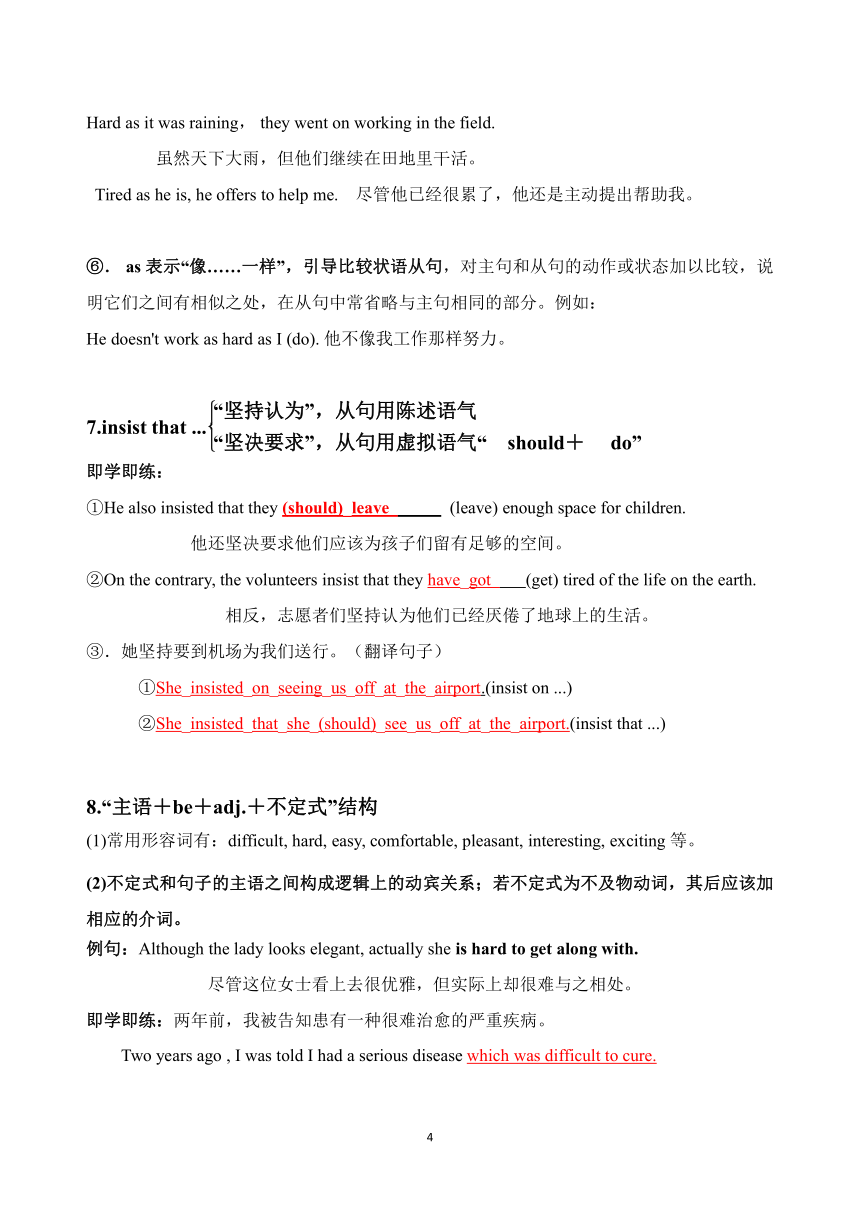
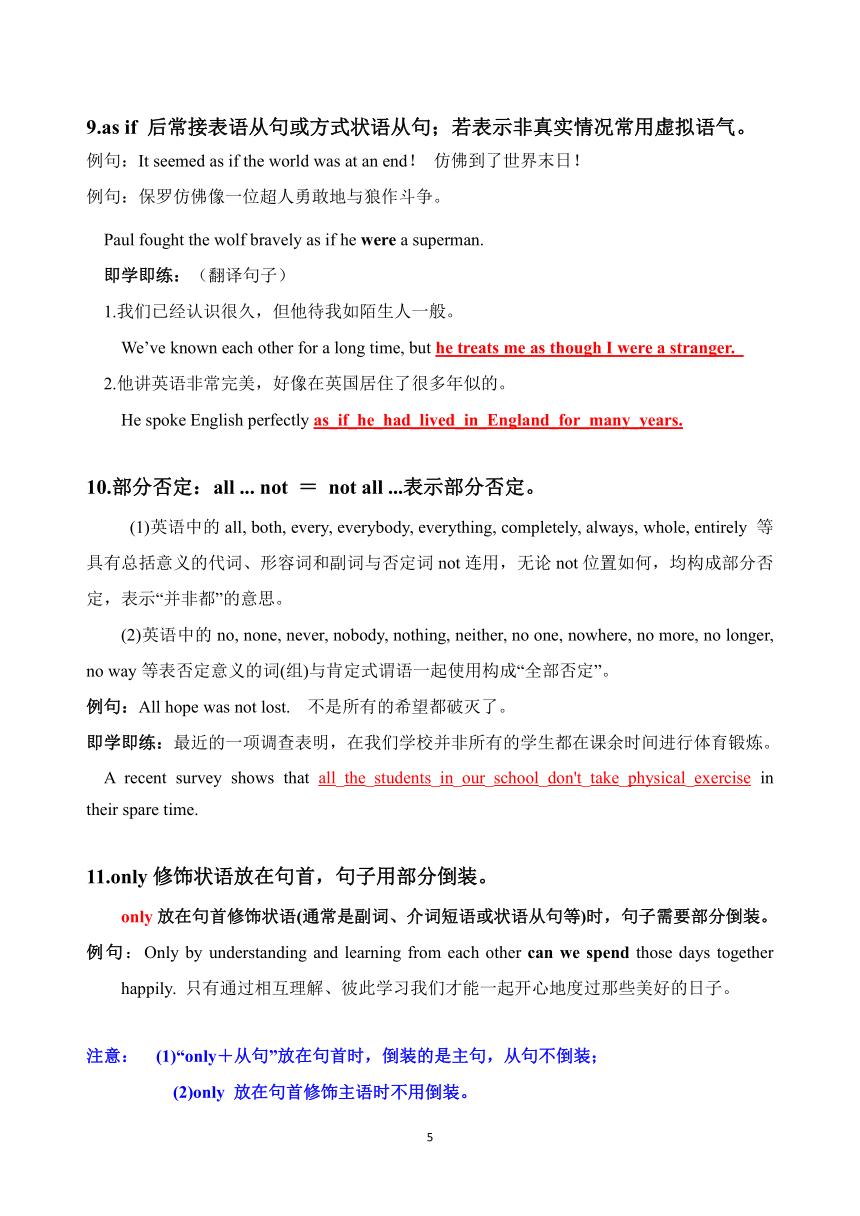
文档简介
2023届高考英语一轮复习重点句型归纳+对点训练
1.while/when状语从句的省略。
例句:While walking the dog, you were careless and it got loose and was hit by a car.
在遛狗的时候,你不小心松了手,结果它被一辆汽车撞了。
即学即练1:出去散步的时候,你应该随身带一个小垃圾袋。
While_going_for_a_walk,_you should take along a small garbage bag.
即学即练2:Water turns into vapour when it is heated.
→改成省略句:Water turns into vapour when heated.
即学即练3:(单句语法填空)
When_____asked_______(ask)why he was late, he kept silent.
I fell asleep while___watching______________(watch)TV.
2. be doing/ be about to do/be on the point of doing / had done…, when…(when:这时, 强调一个动作的突然发生)
1). I was walking along the river, when I heard a drowning boy cry for help.
2). I was about to leave when it began to rain.
3). I had just finished my test paper when the bell rang, announcing the exam was over.
即学即练1.:我刚刚坐下来工作就听到有人在敲门。
I had_just_sat_down_to_work_when I heard someone knocking at the door.
即学即练2. 我们正在看电视,这时候妈妈进来了。
We were watching TV when our mom came in.
强调句型: It is (was)+被强调部分 (主语 、 宾语 或 状语)+who (that)..."
e.g.: I met him in the street yesterday afternoon.
强调主语:
It was I who/ that met him in the street yesterday afternoon.(强调是我,不是别人)
强调宾语:
It was him who/ that I met in the street yesterday afternoon.( 强调我遇见的是他,不是别人)
强调地点状语:
It was in the street that I met him yesterday afternoon.( 强调是在大街上,不是在别 的地方,强调的是地点,但不用where)
强调时间状语:
It was yesterday afternoon that I met him in the street (强调是 昨天下午,不是在别 的时候, 强调的是时间,但不用when)
注意1:that后的强调句如果是原因状语从句,从句只能用because引导,不能用since,as或why。
例句:It was because the water had risen that they could not cross the river。
即学即练:翻译句子
正是他的不懈努力使得中国逐渐发生变化。
It_was_his_continuous_efforts_that caused China to change gradually.
注意2.含有not ... until ...的强调句型:It is/was not until+被强调部分+that ...+其他。
It was not until near the end of the letter that she mentioned her own plan.
即学即练:
The villagers didn’t realize how serious the pollution was until all the fish died in the river.
It was not until all the fish died in the river that the villagers realized how serious the pollution was. (强调句)
注意3:
以上强调句型是对除谓语以外的成分的强调;若强调谓语,要在谓语动词前加do/does/did,这种强调只适用于一般现在时和一般过去时的肯定句。
The scientist did devote all his life to his research work.
这位科学家真正地把他的一生献给了研究工作。
It/This/That is the first time that sb. has (have) done sth.“这/那是某人第一次做某事”。
例句:This is the first time that I have ridden a horse. (注意时态运用)
It/This/That was the first time that sb. had done sth.“这/那是某人第一次做某事”。
例句:This was the first time that I had ridden a horse. (注意时态运用)
即学即练:单句语法填空
This isn't the first time that technology_has_changed_____(change) our manners.
It was the second time I ___had got____________(get)the prize.
as 引导的六大从句
①.as引导时间状语从句,意为“随着”、“当。。。时”。
例句:As time went by, I was made smaller.
随着时间的流逝,我被做得更小了。
即学即练:随着技术的发展和生活水平的提高,智能手机已进入寻常百姓家。
As_technology_develops_and_life_improves,_smartphones have entered the ordinary people's homes.
当我在车站等车的时候,我听到一个很大的声响。
As I waited at the stop, I heard a big noise.
②.as引导方式状语从句,意为“按照;如同”。
即学即练:我们应该按照该组织的建议来保护这一地区的珍稀动物。
We should protect the rare animals in this area as_the_organization_suggests.
③.as引导的从句有定语从句
As is known to everybody(= As we all know), the moon travels round the earth.
④.as引导的原因状语从句,其语气不如because强,通常为附加说明的理由,且是已知晓的原因,主句与从句没有逻辑上的因果关系。例如:
As she was not well, I went there alone. 因为她身体不好,所以我独自到那里去了。
⑤.as可引导让步状语从句,表示“虽然、尽管”,但要用部分倒装结构,形式如下:
as可引导让步状语从句,表示“虽然、尽管”,但要用部分倒装结构,形式如下:
Child as he is, he knows a lot. 虽然他是个孩子,但他知道的东西很多。
Hard as it was raining, they went on working in the field.
虽然天下大雨,但他们继续在田地里干活。
Tired as he is, he offers to help me. 尽管他已经很累了,他还是主动提出帮助我。
⑥. as表示“像……一样”,引导比较状语从句,对主句和从句的动作或状态加以比较,说明它们之间有相似之处,在从句中常省略与主句相同的部分。例如:
He doesn't work as hard as I (do). 他不像我工作那样努力。
7.insist that ...
即学即练:
①He also insisted that they (should)_leave (leave) enough space for children.
他还坚决要求他们应该为孩子们留有足够的空间。
②On the contrary, the volunteers insist that they have_got (get) tired of the life on the earth.
相反,志愿者们坚持认为他们已经厌倦了地球上的生活。
③.她坚持要到机场为我们送行。(翻译句子)
①She_insisted_on_seeing_us_off_at_the_airport.(insist on ...)
②She_insisted_that_she_(should)_see_us_off_at_the_airport.(insist that ...)
8.“主语+be+adj.+不定式”结构
(1)常用形容词有:difficult, hard, easy, comfortable, pleasant, interesting, exciting等。
(2)不定式和句子的主语之间构成逻辑上的动宾关系;若不定式为不及物动词,其后应该加相应的介词。
例句:Although the lady looks elegant, actually she is hard to get along with.
尽管这位女士看上去很优雅,但实际上却很难与之相处。
即学即练:两年前,我被告知患有一种很难治愈的严重疾病。
Two years ago , I was told I had a serious disease which was difficult to cure.
9.as if 后常接表语从句或方式状语从句;若表示非真实情况常用虚拟语气。
例句:It seemed as if the world was at an end! 仿佛到了世界末日!
例句:保罗仿佛像一位超人勇敢地与狼作斗争。
Paul fought the wolf bravely as if he were a superman.
即学即练:(翻译句子)
1.我们已经认识很久,但他待我如陌生人一般。
We’ve known each other for a long time, but he treats me as though I were a stranger.
2.他讲英语非常完美,好像在英国居住了很多年似的。
He spoke English perfectly as_if_he_had_lived_in_England_for_many_years.
10.部分否定:all ... not = not all ...表示部分否定。
(1)英语中的all, both, every, everybody, everything, completely, always, whole, entirely 等具有总括意义的代词、形容词和副词与否定词not连用,无论not位置如何,均构成部分否定,表示“并非都”的意思。
(2)英语中的no, none, never, nobody, nothing, neither, no one, nowhere, no more, no longer, no way等表否定意义的词(组)与肯定式谓语一起使用构成“全部否定”。
例句:All hope was not lost. 不是所有的希望都破灭了。
即学即练:最近的一项调查表明,在我们学校并非所有的学生都在课余时间进行体育锻炼。
A recent survey shows that all_the_students_in_our_school_don't_take_physical_exercise in their spare time.
11.only修饰状语放在句首,句子用部分倒装。
only放在句首修饰状语(通常是副词、介词短语或状语从句等)时,句子需要部分倒装。
例句:Only by understanding and learning from each other can we spend those days together happily. 只有通过相互理解、彼此学习我们才能一起开心地度过那些美好的日子。
注意: (1)“only+从句”放在句首时,倒装的是主句,从句不倒装;
(2)only 放在句首修饰主语时不用倒装。
例句:Only a few of the children haven't yet got a chance of being educated.
仍有少数儿童未得到受教育的机会。
即学即练:I realized knowledge is valuable only when I had another failure in my job seeking
→(倒装句)
Only when I had another failure in my job seeking did_I_realize_knowledge_is_valuable.
12. not only….. but (also)…..
引导并列结构:主语时,谓语动词与邻近的一个主语保持一致。
1). Not only the teacher but also the students have their eyes examined regularly.
2). They suggested we should not only attend the party, but give a performance.
They suggested we should give a performance as well as attend the party
not only….. but (also)…..引导并列句时,not only引导的部分置于句首时要部分倒装
例句: 1). Not only was everything he had taken away, but also his German citizenship was taken away.
2). Not only should we students study hard, but also we should know how to enjoy ourselves in our spare time.
即学即练:她不仅仅迟到了3次,她还没干一点活。
Not only has she been late three times, but also she has done no work.
13. only to do 作结果状语,多用来表示出人意料、结局令人沮丧的结果。动词多是终结性的词,如:find, learn, to be told, to be caught等
即学即练:(单句语法填空) He hurried to his office, only to be told(tell) that he was dismissed.
14.完全倒装
以here, there, in, out, up, down等副词开头的倒装句(多用一般现在时表示正在进行的动作。)
1). Here comes the bus! (=The bus is coming here! )
2). Away he went. 他走远了(若主语是代词则主语与谓语不倒装)
15. 方位状语位于句首时的倒装句
1). In front of the house stopped a police car.
2).Under the tree sat a boy, with a book in his hand.
16. 具有否定意义的副词或短语位于句首时句子要部分倒装。常用的此有:little, never, seldom, hardly, rarely, no sooner, in no time, by no means, in no case 等
1). Not a single mistake did he make in the exam.
2). In no time did the man realize what was happening.
3).In no case can you tell him the truth.
4). Hardly had the train left when he remembered he had left his suitcase on it.
5) No sooner had the train left than he remembered he had left his suitcase on it.
17.(1)There is no doubt that ...“毫无疑问……”。
(2)There is some doubt whether ... 有……疑问
例句:There is no doubt that nearsightedness is a serious problem among the youth of our country .
毫没有疑问问地近视在我国的年青人中是一个严重的问题。
即学即练1:(翻译句子)
越来越多的人意识到了健康的重要性。毫无疑问,健康比财富重要。
More and more people have realized the importance of health. There_is_no_doubt_that health is more important than wealth.
即学即练2:(单句语法填空)There is still some doubt whether the autumn sports meeting will be held in our school.
18.“the+比较级...,the+比较级...”,意为“越……,就越……”。
例句:This is important because the more you speak English, the better your English will become.
这很重要,因为你说英语越多,你的英语水平就会越高。
即学即练:起初,我以为我明白了老师所说的,但是他越解释我就越迷惑。
At first I thought I understood what my teacher said, but the more he explained, the_more_confused_I_became.
19.It was (not ) + 时间段+before +一般过去时 过了一段时间就……..
It will (not )be+ 时间段+before +一般现在时 要过一段时间才会…
It is/ has been +时间段+ since…..
It was +点时间+ when…..
It was +时间状语+ that …..(强调句)
1). It was not long before he sensed the danger of the position.不久他就意识到他处境危险 (动作已发生)
2). It will be half a year before you graduate from the school. 还有半年你才从这个学校毕业(动作未发生)
3). It is /(has been )3 years since he worked here.=he left here.(since从句中的谓语动词若是延续性动词,要从这个动作结束的时候算起)
4). It was 3 o’clock when they received the telephone.
5) It was at 3 o’clock that they received the telephone.
20.. with 的复合结构(作状语或作定语)
with+ n. +adj. (with可以省略)
1).(With) the street wet and slippery, we had to ride our bikes slowly and carefully.
Because the street were wet and slippery, ……….
2). The students were listening to the teacher, (with)their eyes wide open.
The students were listening to the teacher, and their eyes were wide open.
with+ n. +adv. (with可以省略)
1). He put on his coat hurriedly, (with) the wrong side out
with+ n. +prep-phrase (with可以省略)
1). The old man was seated in the sofa, (with) a pipe in his mouth.(Also: pipe in mouth)
with+ n.+ to do/ to be done (动词不定式的动作还未进行)
with+ n.+ doing/ being done (动词不定式的动作正在进行)
with+ n.+ done (动词不定式的动作已经完成或指n. 所处的状态)
1). With so many problems to settle, the newly-elected president is having a hard year.
2). He was lying in bed, with his eyes fixed on the ceiling
3). With the temple being repaired, we can’t visited it.
即学即练:单句语法填空
.With a lot of things__to do_______(do), he had to stay there for another day.
She had to walk home with her bike ____stolen___________(steal).
With the crowds cheering (cheer), they drove to the palace.
21.It的句型
①. 不定式作主语,it作形式主语:
It +系动词+adj./ n..+ for sb. to do (for sb.表示动词不定式动作的执行者)
It +系动词+adj.+ of sb. to do (of sb.既表示动词不定式动作的执行者有表示人所具备的性质或特征)
1). It’s important for us to have a good knowledge of English.
2). How rude of him to treat a child like that!
3). It’s thoughtful of him to fix us up for the night.
不定式作宾语,it作形式宾语:
主语+think/ consider/believe/ make/ feel+ it +adj./n. +for sb./ of sb. +to do
1). I feel it foolish of him to believe such a man.
2). The timely rain had made it possible for the crops to grow well.
It is said/ thought/ hoped/ believed…..that……
Sb. is said/ thought/ hoped/ believed to do…..
1). It is said that he is studying abroad.--> He is said to be studying abroad.
2).It is considered that many countries highly value China’s role in helping world’s peace.
Many countries is considered to highly value China’s role in helping world’s peace.
It is time to do/ It is time that +主语+动词的一般过去式 该是做…..的时候了 (虚拟语气)
1).It is time that we ended the discussion.
即学即练:翻译句子:显而易见长江之旅将是更好的选择。
It_is_obvious_that the trip along the Yangtze River will be a better choice.
.can never/ can’t 与too, too much, enough, over- 搭配表示“无论怎样….都不过分”
(尝试翻译下列句子)
1). While you are doing your homework, you can’t be careful enough.
2). He is such a great man that we can’t praise him too much.
3). William Hartley was handsome, determined and hardworking, in a word, I couldn’t speak too highly of him.
4). The development of society has made it necessary for us to have a good knowledge of English, so we can’t overemphasize the importance of learning English.
5). Since it is a good thing, we can’t do it too soon.
即学即练:翻译:You can’t be too careful.
你越仔细越好。
23.否定词与比较级连用表示最高级含义。
“Nothing could be better,” he thought. 他想:“再没有比这些更好吃的了。”
即学即练:就我个人而言,在我们日常生活中身体健康最重要。(书面表达)
From my point of view, nothing_is_more_important_than_health in our daily life.
24.whenever引导让步状语从句。
Indeed, sir, I hope you'll come here whenever you like.
真的,先生,我希望您随时光临。
即学即练:没有人比我们的父母更关心我们,无论何时我们有困难他们总会乐于帮助我们。
Nobody is more concerned about us than our parents, who are willing to come to our assistance whenever_we_are_in_trouble.
25.The reason why…is that… 这是特定句型,why 引导定语从句,is 后的用词为 that,不用 because.
例句1∶ The reason why he could not go there was that his grades were too low.
例句2∶The reason why she did it is that she wouldn't let her parents feel disappointed. 她做那件事是因为她不想让父母失望。
翻译句子:他迟到的原因是他起床晚了。
The reason why/for which he was late was that he got up late.
1.while/when状语从句的省略。
例句:While walking the dog, you were careless and it got loose and was hit by a car.
在遛狗的时候,你不小心松了手,结果它被一辆汽车撞了。
即学即练1:出去散步的时候,你应该随身带一个小垃圾袋。
While_going_for_a_walk,_you should take along a small garbage bag.
即学即练2:Water turns into vapour when it is heated.
→改成省略句:Water turns into vapour when heated.
即学即练3:(单句语法填空)
When_____asked_______(ask)why he was late, he kept silent.
I fell asleep while___watching______________(watch)TV.
2. be doing/ be about to do/be on the point of doing / had done…, when…(when:这时, 强调一个动作的突然发生)
1). I was walking along the river, when I heard a drowning boy cry for help.
2). I was about to leave when it began to rain.
3). I had just finished my test paper when the bell rang, announcing the exam was over.
即学即练1.:我刚刚坐下来工作就听到有人在敲门。
I had_just_sat_down_to_work_when I heard someone knocking at the door.
即学即练2. 我们正在看电视,这时候妈妈进来了。
We were watching TV when our mom came in.
强调句型: It is (was)+被强调部分 (主语 、 宾语 或 状语)+who (that)..."
e.g.: I met him in the street yesterday afternoon.
强调主语:
It was I who/ that met him in the street yesterday afternoon.(强调是我,不是别人)
强调宾语:
It was him who/ that I met in the street yesterday afternoon.( 强调我遇见的是他,不是别人)
强调地点状语:
It was in the street that I met him yesterday afternoon.( 强调是在大街上,不是在别 的地方,强调的是地点,但不用where)
强调时间状语:
It was yesterday afternoon that I met him in the street (强调是 昨天下午,不是在别 的时候, 强调的是时间,但不用when)
注意1:that后的强调句如果是原因状语从句,从句只能用because引导,不能用since,as或why。
例句:It was because the water had risen that they could not cross the river。
即学即练:翻译句子
正是他的不懈努力使得中国逐渐发生变化。
It_was_his_continuous_efforts_that caused China to change gradually.
注意2.含有not ... until ...的强调句型:It is/was not until+被强调部分+that ...+其他。
It was not until near the end of the letter that she mentioned her own plan.
即学即练:
The villagers didn’t realize how serious the pollution was until all the fish died in the river.
It was not until all the fish died in the river that the villagers realized how serious the pollution was. (强调句)
注意3:
以上强调句型是对除谓语以外的成分的强调;若强调谓语,要在谓语动词前加do/does/did,这种强调只适用于一般现在时和一般过去时的肯定句。
The scientist did devote all his life to his research work.
这位科学家真正地把他的一生献给了研究工作。
It/This/That is the first time that sb. has (have) done sth.“这/那是某人第一次做某事”。
例句:This is the first time that I have ridden a horse. (注意时态运用)
It/This/That was the first time that sb. had done sth.“这/那是某人第一次做某事”。
例句:This was the first time that I had ridden a horse. (注意时态运用)
即学即练:单句语法填空
This isn't the first time that technology_has_changed_____(change) our manners.
It was the second time I ___had got____________(get)the prize.
as 引导的六大从句
①.as引导时间状语从句,意为“随着”、“当。。。时”。
例句:As time went by, I was made smaller.
随着时间的流逝,我被做得更小了。
即学即练:随着技术的发展和生活水平的提高,智能手机已进入寻常百姓家。
As_technology_develops_and_life_improves,_smartphones have entered the ordinary people's homes.
当我在车站等车的时候,我听到一个很大的声响。
As I waited at the stop, I heard a big noise.
②.as引导方式状语从句,意为“按照;如同”。
即学即练:我们应该按照该组织的建议来保护这一地区的珍稀动物。
We should protect the rare animals in this area as_the_organization_suggests.
③.as引导的从句有定语从句
As is known to everybody(= As we all know), the moon travels round the earth.
④.as引导的原因状语从句,其语气不如because强,通常为附加说明的理由,且是已知晓的原因,主句与从句没有逻辑上的因果关系。例如:
As she was not well, I went there alone. 因为她身体不好,所以我独自到那里去了。
⑤.as可引导让步状语从句,表示“虽然、尽管”,但要用部分倒装结构,形式如下:
as可引导让步状语从句,表示“虽然、尽管”,但要用部分倒装结构,形式如下:
Child as he is, he knows a lot. 虽然他是个孩子,但他知道的东西很多。
Hard as it was raining, they went on working in the field.
虽然天下大雨,但他们继续在田地里干活。
Tired as he is, he offers to help me. 尽管他已经很累了,他还是主动提出帮助我。
⑥. as表示“像……一样”,引导比较状语从句,对主句和从句的动作或状态加以比较,说明它们之间有相似之处,在从句中常省略与主句相同的部分。例如:
He doesn't work as hard as I (do). 他不像我工作那样努力。
7.insist that ...
即学即练:
①He also insisted that they (should)_leave (leave) enough space for children.
他还坚决要求他们应该为孩子们留有足够的空间。
②On the contrary, the volunteers insist that they have_got (get) tired of the life on the earth.
相反,志愿者们坚持认为他们已经厌倦了地球上的生活。
③.她坚持要到机场为我们送行。(翻译句子)
①She_insisted_on_seeing_us_off_at_the_airport.(insist on ...)
②She_insisted_that_she_(should)_see_us_off_at_the_airport.(insist that ...)
8.“主语+be+adj.+不定式”结构
(1)常用形容词有:difficult, hard, easy, comfortable, pleasant, interesting, exciting等。
(2)不定式和句子的主语之间构成逻辑上的动宾关系;若不定式为不及物动词,其后应该加相应的介词。
例句:Although the lady looks elegant, actually she is hard to get along with.
尽管这位女士看上去很优雅,但实际上却很难与之相处。
即学即练:两年前,我被告知患有一种很难治愈的严重疾病。
Two years ago , I was told I had a serious disease which was difficult to cure.
9.as if 后常接表语从句或方式状语从句;若表示非真实情况常用虚拟语气。
例句:It seemed as if the world was at an end! 仿佛到了世界末日!
例句:保罗仿佛像一位超人勇敢地与狼作斗争。
Paul fought the wolf bravely as if he were a superman.
即学即练:(翻译句子)
1.我们已经认识很久,但他待我如陌生人一般。
We’ve known each other for a long time, but he treats me as though I were a stranger.
2.他讲英语非常完美,好像在英国居住了很多年似的。
He spoke English perfectly as_if_he_had_lived_in_England_for_many_years.
10.部分否定:all ... not = not all ...表示部分否定。
(1)英语中的all, both, every, everybody, everything, completely, always, whole, entirely 等具有总括意义的代词、形容词和副词与否定词not连用,无论not位置如何,均构成部分否定,表示“并非都”的意思。
(2)英语中的no, none, never, nobody, nothing, neither, no one, nowhere, no more, no longer, no way等表否定意义的词(组)与肯定式谓语一起使用构成“全部否定”。
例句:All hope was not lost. 不是所有的希望都破灭了。
即学即练:最近的一项调查表明,在我们学校并非所有的学生都在课余时间进行体育锻炼。
A recent survey shows that all_the_students_in_our_school_don't_take_physical_exercise in their spare time.
11.only修饰状语放在句首,句子用部分倒装。
only放在句首修饰状语(通常是副词、介词短语或状语从句等)时,句子需要部分倒装。
例句:Only by understanding and learning from each other can we spend those days together happily. 只有通过相互理解、彼此学习我们才能一起开心地度过那些美好的日子。
注意: (1)“only+从句”放在句首时,倒装的是主句,从句不倒装;
(2)only 放在句首修饰主语时不用倒装。
例句:Only a few of the children haven't yet got a chance of being educated.
仍有少数儿童未得到受教育的机会。
即学即练:I realized knowledge is valuable only when I had another failure in my job seeking
→(倒装句)
Only when I had another failure in my job seeking did_I_realize_knowledge_is_valuable.
12. not only….. but (also)…..
引导并列结构:主语时,谓语动词与邻近的一个主语保持一致。
1). Not only the teacher but also the students have their eyes examined regularly.
2). They suggested we should not only attend the party, but give a performance.
They suggested we should give a performance as well as attend the party
not only….. but (also)…..引导并列句时,not only引导的部分置于句首时要部分倒装
例句: 1). Not only was everything he had taken away, but also his German citizenship was taken away.
2). Not only should we students study hard, but also we should know how to enjoy ourselves in our spare time.
即学即练:她不仅仅迟到了3次,她还没干一点活。
Not only has she been late three times, but also she has done no work.
13. only to do 作结果状语,多用来表示出人意料、结局令人沮丧的结果。动词多是终结性的词,如:find, learn, to be told, to be caught等
即学即练:(单句语法填空) He hurried to his office, only to be told(tell) that he was dismissed.
14.完全倒装
以here, there, in, out, up, down等副词开头的倒装句(多用一般现在时表示正在进行的动作。)
1). Here comes the bus! (=The bus is coming here! )
2). Away he went. 他走远了(若主语是代词则主语与谓语不倒装)
15. 方位状语位于句首时的倒装句
1). In front of the house stopped a police car.
2).Under the tree sat a boy, with a book in his hand.
16. 具有否定意义的副词或短语位于句首时句子要部分倒装。常用的此有:little, never, seldom, hardly, rarely, no sooner, in no time, by no means, in no case 等
1). Not a single mistake did he make in the exam.
2). In no time did the man realize what was happening.
3).In no case can you tell him the truth.
4). Hardly had the train left when he remembered he had left his suitcase on it.
5) No sooner had the train left than he remembered he had left his suitcase on it.
17.(1)There is no doubt that ...“毫无疑问……”。
(2)There is some doubt whether ... 有……疑问
例句:There is no doubt that nearsightedness is a serious problem among the youth of our country .
毫没有疑问问地近视在我国的年青人中是一个严重的问题。
即学即练1:(翻译句子)
越来越多的人意识到了健康的重要性。毫无疑问,健康比财富重要。
More and more people have realized the importance of health. There_is_no_doubt_that health is more important than wealth.
即学即练2:(单句语法填空)There is still some doubt whether the autumn sports meeting will be held in our school.
18.“the+比较级...,the+比较级...”,意为“越……,就越……”。
例句:This is important because the more you speak English, the better your English will become.
这很重要,因为你说英语越多,你的英语水平就会越高。
即学即练:起初,我以为我明白了老师所说的,但是他越解释我就越迷惑。
At first I thought I understood what my teacher said, but the more he explained, the_more_confused_I_became.
19.It was (not ) + 时间段+before +一般过去时 过了一段时间就……..
It will (not )be+ 时间段+before +一般现在时 要过一段时间才会…
It is/ has been +时间段+ since…..
It was +点时间+ when…..
It was +时间状语+ that …..(强调句)
1). It was not long before he sensed the danger of the position.不久他就意识到他处境危险 (动作已发生)
2). It will be half a year before you graduate from the school. 还有半年你才从这个学校毕业(动作未发生)
3). It is /(has been )3 years since he worked here.=he left here.(since从句中的谓语动词若是延续性动词,要从这个动作结束的时候算起)
4). It was 3 o’clock when they received the telephone.
5) It was at 3 o’clock that they received the telephone.
20.. with 的复合结构(作状语或作定语)
with+ n. +adj. (with可以省略)
1).(With) the street wet and slippery, we had to ride our bikes slowly and carefully.
Because the street were wet and slippery, ……….
2). The students were listening to the teacher, (with)their eyes wide open.
The students were listening to the teacher, and their eyes were wide open.
with+ n. +adv. (with可以省略)
1). He put on his coat hurriedly, (with) the wrong side out
with+ n. +prep-phrase (with可以省略)
1). The old man was seated in the sofa, (with) a pipe in his mouth.(Also: pipe in mouth)
with+ n.+ to do/ to be done (动词不定式的动作还未进行)
with+ n.+ doing/ being done (动词不定式的动作正在进行)
with+ n.+ done (动词不定式的动作已经完成或指n. 所处的状态)
1). With so many problems to settle, the newly-elected president is having a hard year.
2). He was lying in bed, with his eyes fixed on the ceiling
3). With the temple being repaired, we can’t visited it.
即学即练:单句语法填空
.With a lot of things__to do_______(do), he had to stay there for another day.
She had to walk home with her bike ____stolen___________(steal).
With the crowds cheering (cheer), they drove to the palace.
21.It的句型
①. 不定式作主语,it作形式主语:
It +系动词+adj./ n..+ for sb. to do (for sb.表示动词不定式动作的执行者)
It +系动词+adj.+ of sb. to do (of sb.既表示动词不定式动作的执行者有表示人所具备的性质或特征)
1). It’s important for us to have a good knowledge of English.
2). How rude of him to treat a child like that!
3). It’s thoughtful of him to fix us up for the night.
不定式作宾语,it作形式宾语:
主语+think/ consider/believe/ make/ feel+ it +adj./n. +for sb./ of sb. +to do
1). I feel it foolish of him to believe such a man.
2). The timely rain had made it possible for the crops to grow well.
It is said/ thought/ hoped/ believed…..that……
Sb. is said/ thought/ hoped/ believed to do…..
1). It is said that he is studying abroad.--> He is said to be studying abroad.
2).It is considered that many countries highly value China’s role in helping world’s peace.
Many countries is considered to highly value China’s role in helping world’s peace.
It is time to do/ It is time that +主语+动词的一般过去式 该是做…..的时候了 (虚拟语气)
1).It is time that we ended the discussion.
即学即练:翻译句子:显而易见长江之旅将是更好的选择。
It_is_obvious_that the trip along the Yangtze River will be a better choice.
.can never/ can’t 与too, too much, enough, over- 搭配表示“无论怎样….都不过分”
(尝试翻译下列句子)
1). While you are doing your homework, you can’t be careful enough.
2). He is such a great man that we can’t praise him too much.
3). William Hartley was handsome, determined and hardworking, in a word, I couldn’t speak too highly of him.
4). The development of society has made it necessary for us to have a good knowledge of English, so we can’t overemphasize the importance of learning English.
5). Since it is a good thing, we can’t do it too soon.
即学即练:翻译:You can’t be too careful.
你越仔细越好。
23.否定词与比较级连用表示最高级含义。
“Nothing could be better,” he thought. 他想:“再没有比这些更好吃的了。”
即学即练:就我个人而言,在我们日常生活中身体健康最重要。(书面表达)
From my point of view, nothing_is_more_important_than_health in our daily life.
24.whenever引导让步状语从句。
Indeed, sir, I hope you'll come here whenever you like.
真的,先生,我希望您随时光临。
即学即练:没有人比我们的父母更关心我们,无论何时我们有困难他们总会乐于帮助我们。
Nobody is more concerned about us than our parents, who are willing to come to our assistance whenever_we_are_in_trouble.
25.The reason why…is that… 这是特定句型,why 引导定语从句,is 后的用词为 that,不用 because.
例句1∶ The reason why he could not go there was that his grades were too low.
例句2∶The reason why she did it is that she wouldn't let her parents feel disappointed. 她做那件事是因为她不想让父母失望。
翻译句子:他迟到的原因是他起床晚了。
The reason why/for which he was late was that he got up late.
同课章节目录
